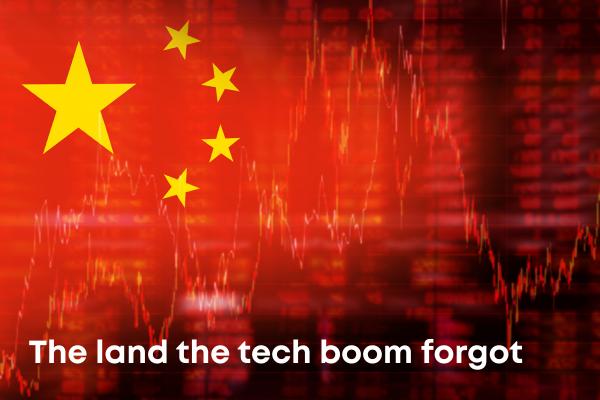In the wake of the coronavirus, global tech stocks enjoyed an unprecedented boom. It truly was nothing short of spectacular, with companies making ten years' worth of gains in the space of just a few months. There was, however, one notable exception: China.
This was particularly surprising given the erstwhile rapid growth rate of Asia's biggest economy and its current position in the development cycle. Far from rivalling their US counterparts Alphabet, Amazon and Facebook, China's tech giants Alibaba, Baidu and Tencent actually saw an average of 40-50% knocked off their share prices. But as shocking as this all might seem, there is, in fact, a perfectly understandable explanation for it.
So, is this the end of the road for Chinese stocks, or are we looking at the buying opportunity of a lifetime? Without a crystal ball, it's impossible to say for sure where prices are headed. However, what we can do is look at the reasons behind the recent declines and assess the future prospects of the tech space in China.
So, what's the story?
It's no secret that the Chinese authorities have been wary of Big Tech for some time now. And it just so happened that the advent of the coronavirus coincided with the regulators finally cracking down on the once freewheeling sector. The brunt of their ire fell on Alibaba CEO Jack Ma, leading to the cancellation of the Ant Financial IPO and a huge $2.8 billion antitrust fine for the e-commerce leviathan. This led to a nearly 70% decline in Alibaba's share price and started a chain reaction across Chinese tech stocks, initiating a downtrend, the end of which is still not in sight.
In reality, though, this has been a long time coming. The CCP has been gradually taking legislative action to rein in their biggest data holders, starting with its Cybersecurity Law (enacted 2017). This was then followed by its Data Security Law (enacted 2021), with the trifecta eventually completed by the Personal Information Protection Law (also enacted in 2021). Now that the government has its protective legal framework in place, it might just spell the end of the crackdowns. Assuming they all play ball with the regulators, the bulk of the damage could already be priced into the shares of Alibaba, Baidu and Tencent.
But why?
The reason for the CCP's regulatory offensive is actually quite simple. Data has been heralded as the new gold, and nobody recognises this more acutely than the Chinese government, which recently listed data as a "factor of production" on par with the traditional factors of socialist economic policy: land, labour, capital and technology.
In light of this, it's understandable that the authorities were not particularly happy about its biggest data holders listing on US stock exchanges, where they can be required to share precious bytes with local regulators. It's no coincidence that the past couple of years has seen a raft of secondary Hong Kong listings from China's tech elite. The Chinese government has been encouraging firms to migrate to exchanges within its sphere of influence for some time as it seeks to build its own Shanghai-based answer to the Nasdaq, the Star Market.
This explains why Didi (which does not yet have a second listing) was so hard-hit post-IPO, with the authorities removing its apps from domestic stores for suspected data breaches. Since Alibaba, Tencent and Baidu are already listed on the Hang Seng, they could be on their way to regaining the Chinese regulators' trust and some of their lost value along with it.
When will it all be over?
The truth is nobody knows for sure. While it looks like there is light at the end of the tunnel as far as regulatory woes go, the current macroeconomic climate makes it tough to tell exactly when growth will return. Aside from the local real estate crisis, the high global inflation rate is also taking its toll on the country's major exporters. While this might be an ongoing problem for Alibaba, Tencent and Baidu can count themselves lucky that their business is largely unaffected by rising raw materials prices.
This relatively minor issue aside, though, there certainly are many positive factors for the entire Chinese tech sector. First, having already taken such a beating of late, there's not much more room for them to fall given their all but assured future as some of China's biggest companies. To put things into perspective, Alibaba is down 58% at the time of writing, while Baidu and Tencent aren't faring much better with 32% and 39% losses of their own. When taken together with the fact that all of them are present in some way in the rapidly developing countries of South-East Asia, this gives them every chance of reaching the market cap of US counterparts Amazon, Alphabet and Facebook in the next ten years, making current prices an absolute steal!
Is there a way to play with a Big Tiger?
Attempting to trade the market is always risky, and this is especially true when it comes to China. There are far too many variables, political and otherwise, to make short term bets on individual stocks here. As for leverage, don't even think about it! All of that aside, every serious investor ought to have at least some portion of his or her portfolio invested in the Asian powerhouse.
While the short-term risks are very real (and totally unpredictable), it's hard to imagine a scenario where China's tech giants fail to grow their businesses multiple times over in the decade ahead. As such, some form of measured, long-term, and unleveraged (can't stress this enough) investment in these instruments should at least be on the radar for even the most risk-averse of investors, especially at these valuations.
With Libertex Portfolio, you can purchase individual shares in Alibaba, Tencent and Baidu – or a wider basket of Chinese tech firms via the iShares China Large-Cap ETF – all at the touch of a button. Best of all, Libertex charges no commission whatsoever on investments made via Libertex Portfolio, which means more of your potential profits stay in your pocket. For more information or to register an account, visit http://www.libertex.org/invest
Jurisdictional limitations: Libertex Portfolio is not available in the European Union and other restricted countries such as: Russia, USA, Japan, Brazil; countries identified by FATF as high risk and non-cooperative jurisdictions having strategic AML/CFT deficiencies; and countries that are under international sanctions






